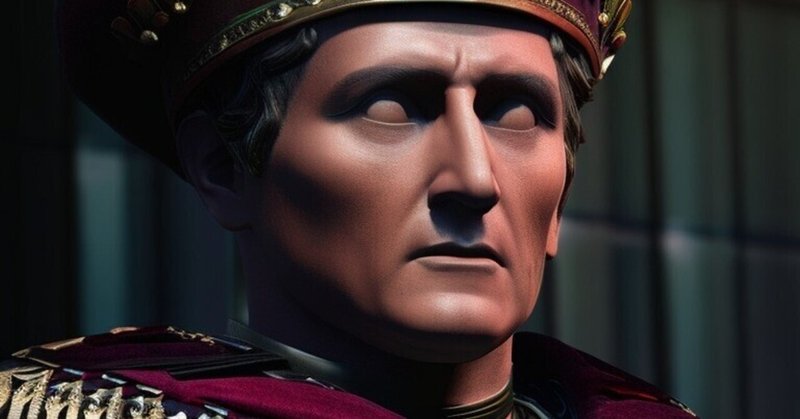
英語長文問題クエスト Part 81 (テーマ:カエサル)
英語の読解力を伸ばすには多読が必須!特に、TOEFL ibt というテストでは、かなり高度な読解力が必要ですし、何より、このTOEFL ibt という試験が難しいことの理由の1つに、日本語でも勉強していないアカデミックな内容の文章が出題されることです。
このクエストを進めれば、英語の読解力と知識を同時にアップデートさせられるでしょう!
さぁ、今日のクエストを進めてみましょう!
Passage
Title: Julius Caesar: The Roman General and Statesman
Julius Caesar, a prominent figure in Roman history, played a pivotal role in the transformation of the Roman Republic into the Roman Empire. His life and legacy continue to captivate historians, and his name remains synonymous with power, ambition, and political intrigue.
Early Life and Political Career
Born in 100 BCE into a patrician family, Julius Caesar demonstrated leadership qualities from a young age. He rose through the Roman political ranks, becoming known for his eloquence and military prowess. His alliance with Pompey and Crassus, forming the First Triumvirate in 60 BCE, marked a turning point in Roman politics.
The Gallic Wars
One of Caesar's most notable achievements was his conquest of Gaul (modern-day France) in a series of military campaigns known as the Gallic Wars. From 58 to 50 BCE, Caesar's legions fought and triumphed in Gaul, solidifying his reputation as a formidable general. His written accounts of these campaigns, known as the "Commentarii de Bello Gallico" (Commentaries on the Gallic War), provide invaluable insights into his military strategies and the regions he conquered.
The Ides of March and Assassination
Caesar's increasing power and disregard for traditional Republican institutions raised concerns among the Roman Senate and other political elites. On the Ides of March (March 15) in 44 BCE, Julius Caesar was assassinated in a conspiracy led by senators, including Brutus and Cassius. This event marked the end of the Roman Republic.
The Rise of the Roman Empire
Following Caesar's assassination, a power struggle ensued. The Second Triumvirate, consisting of Octavian (later known as Augustus), Mark Antony, and Lepidus, emerged as a ruling coalition. Octavian eventually emerged victorious, and in 27 BCE, he became the first Roman Emperor, taking the name Augustus. This marked the beginning of the Roman Empire, and the Republic was never restored.
Legacy and Influence
Julius Caesar's legacy is far-reaching. He implemented significant reforms, including the Julian calendar, which became the basis for the modern Gregorian calendar. His military campaigns expanded the Roman Empire's territory, and his political maneuvers set the stage for the Roman Empire's establishment. The phrase "Crossing the Rubicon" refers to Caesar's bold move to enter Italy with his army, defying the Senate's orders, and has become synonymous with making an irrevocable decision.
Questions
When was Julius Caesar born?
A) 44 BCE
B) 60 CE
C) 100 BCE
D) 27 CEWhat role did Julius Caesar play in the transformation of the Roman Republic?
A) He led the assassination of the Roman Senate.
B) He formed the First Triumvirate with Pompey and Crassus.
C) He was the first Roman Emperor.
D) He was a prominent philosopher.What were the Gallic Wars, and when did they take place?
A) Wars against the Greeks in 100 BCE
B) Military campaigns in Gaul from 58 to 50 BCE
C) Battles against the Persians in 44 BCE
D) Skirmishes with Germanic tribes in 27 CEWhat is the name of Julius Caesar's written accounts of the Gallic Wars?
A) The Roman Revolution
B) The Aeneid
C) The Commentarii de Bello Gallico
D) The Gallic ChroniclesWhat happened to Julius Caesar on the Ides of March in 44 BCE?
A) He was elected as the Roman Emperor.
B) He was assassinated by senators.
C) He won a decisive battle in Gaul.
D) He signed a peace treaty with Pompey.Who were some of the senators involved in the assassination of Julius Caesar?
A) Mark Antony and Lepidus
B) Pompey and Crassus
C) Brutus and Cassius
D) Augustus and CiceroWhat significant event marked the end of the Roman Republic?
A) The assassination of Julius Caesar
B) The Battle of Actium
C) The formation of the First Triumvirate
D) The Roman RevolutionWho emerged as the first Roman Emperor after the death of Julius Caesar?
A) Pompey
B) Crassus
C) Mark Antony
D) AugustusWhat reforms are attributed to Julius Caesar?
A) The establishment of the Roman Empire
B) The implementation of the Gregorian calendar
C) The creation of the Roman Senate
D) The invention of the Roman alphabetWhat does the phrase "Crossing the Rubicon" refer to?
A) A river in Gaul
B) A decisive military campaign
C) Caesar's irrevocable decision to enter Italy
D) A famous Roman poemWho emerged victorious in the power struggle after Caesar's assassination?
A) Julius Caesar
B) Pompey
C) Mark Antony
D) AugustusWhat title did Octavian take when he became the first Roman Emperor?
A) Julius Caesar II
B) Pompey the Great
C) Mark Antony
D) AugustusWhat happened to the Roman Republic after Julius Caesar's death?
A) It was restored to its former glory.
B) It continued as a republic.
C) It was transformed into the Roman Empire.
D) It fell to barbarian invasions.What is the Julian calendar, attributed to Julius Caesar, the basis for?
A) The Roman Empire's laws
B) Modern legal systems
C) The modern Gregorian calendar
D) The Roman Senate's meetings
Answers and Explanations
ここから先は
この記事が気に入ったらサポートをしてみませんか?
